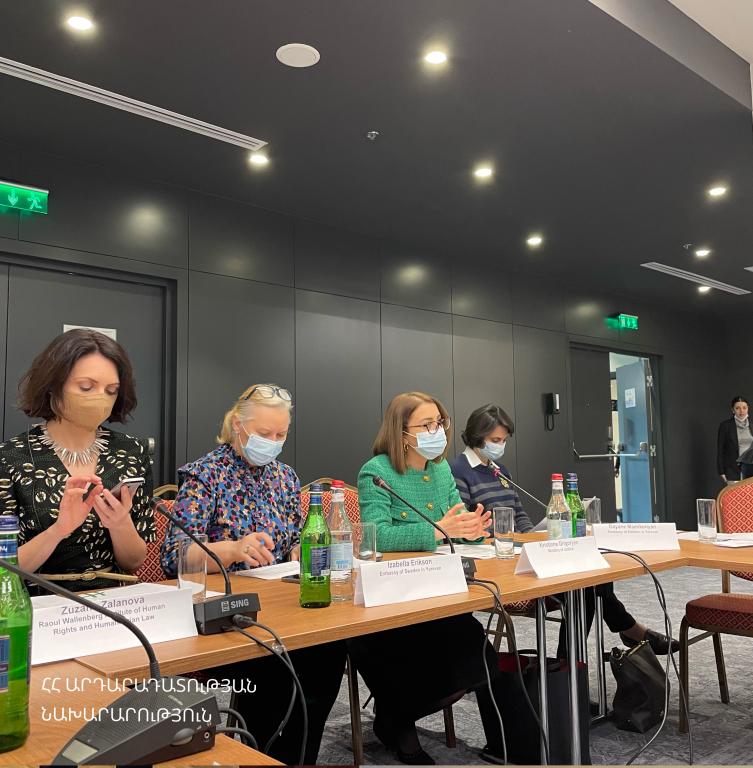Session of Co-ordinating Council for 2020-2022 Action Plan arising from the Strategy on Human Rights Protection and workshop for establishing a cross-sectoral platform for development of independent mechanisms for investigation of torture cases held
01/12/2021

Today, the session of the Co-ordinating Council for the 2020-2022 Action Plan arising from the Strategy on Human Rights Protection, co-ordinated by First Deputy Minister of Justice Kristinne Grigoryan, was held with the participation of representatives of about two dozens of state bodies and civil society representatives.
The meeting was organised in co-operation with the Raoul Wallenberg Institute of Human Rights and Humanitarian Law and with the support of the Swedish International Development Cooperation Agency.
In her opening speech, expressing gratitude to the participants for their attendance and to the international partners for their close co-operation, the Deputy Minister emphasised that human rights protection holds a central place for the Government with respect to the issues of the ensuring of security and the advancement of the state.
In her speech, the Deputy Minister also touched upon the format for submitting progress reports on the activities completed within the framework of the Action Plan arising from the Strategy on Human Rights Protection, as well as a number of other issues related to the activities for development of the Action Plan for the next round.
In her turn, Head of the Yerevan Office of the Swedish International Development Cooperation Agency Isabella Eriksson expressed gratitude for the co-operation and emphasised that Sweden supports the co-operation between the Raoul Wallenberg Institute of Human Rights and Humanitarian Law and the Ministry of Justice of the Republic of Armenia within the framework of implementation of the Action Plan arising from the National Strategy on Human Rights Protection. Eriksson stated that the Government of Sweden encourages the capacity-building of Armenia in the sector of human rights protection and emphasised that the National Action Plan for the Strategy on Human Rights Protection serves as a valuable tool supporting these efforts, as it can ensure human rights protection systemically.
For promoting human rights protection, Isabella Eriksson also attached importance to the organising of such meetings for considering actions and identifying the future directions for action, taking into consideration the challenges that Armenia is facing.
In her turn, Director, Europe Office of Raoul Wallenberg Institute of Human Rights and Humanitarian Law Zuzana Zalanova expressed gratitude for the co-operation and mentioned that, within the scope of its monitoring mandate, the Institute has a goal to contribute to the establishment of frank and constructive dialogue with the involvement of state institutions and civil society.
Afterwards, the representatives of state bodies presented the completed activities arising from the Action Plan arising from the Strategy on Human Rights Protection, and this was followed by a question-and- answer session.
The workshop for establishing a cross-sectoral platform for development of independent mechanisms for investigation of torture cases was launched in the second phase of the meeting.
In her speech, Deputy Minister Kristinne Grigoryan expressed gratitude to the international partners for close co-operation with regard to this issue as well, as well as emphasised that the fight against tortures is stipulated as a key issue under the Strategy on Human Rights Protection, and increase of effectiveness of the fight against tortures is constantly in the focus of the Government.
In her turn, Zuzana Zalanova spoke about the developed practical guide for the fight against tortures and about the process of localising — by the Academy of Justice — the practical guide in the upcoming academic and training programmes.
Afterwards, Head of Thematic Area Fair and Efficient Justice of Raoul Wallenberg Institute of Human Rights and International Law Josh Ounsted and international expert engaged by the Institute Eric Svanidze presented the international practice with regard to this issue, and this was followed by a question-and-answer session with the participants of the workshop.


